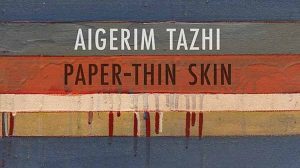Scorpio by Katy Bohinc / Miami University Press / 978-1881163633 / paperback / 71 pages / 2018
…I still believe it starts with
you and me(from “Hung Out”)
I remember when I was young, maybe just having cracked double digits in age, listening to CDs using a handheld CD player with wraparound headphones. It was an unwieldy thing that skipped or went soundless whenever I tilted it (or the headphone plug) at the wrong angle, but I still have such strong happy memories of it because listening to the same CDs on it over and over again was my first real introduction to music. And I remember too the incredible feeling of putting in a new CD, listening to it intently, falling in love with it, and then—just when the tracklist promised it would be over—the hidden track would start, the inclusion of which struck me as almost a pure gift, totally unearned by me except through listening.
 Reading Katy Bohinc’s Scorpio sent me straight back to that listening experience, right down to the inclusion of its own hidden track (a poem called “Endgame”, about which more later). Like the new CDs by my favorite bands I’d anticipate for months, Scorpio comes in the wake of Bohinc’s formidable earlier work: her first book Dear Alain, an epistolary masterwork composed of biting love letters to French philosopher Alain Badiou, and 2017’s Trinity Star Trinity, an incredible and formally compact book-length paean to the divine feminine composed using mathematical constraints. Scorpio provides Bohinc the opportunity to explore the variousness of her lyric gift without the extrinsic framing of a book-length project; these poems breathe like we do, in the pauses between the tracks and after the listed tracks stop, right before the hidden track begins.
Reading Katy Bohinc’s Scorpio sent me straight back to that listening experience, right down to the inclusion of its own hidden track (a poem called “Endgame”, about which more later). Like the new CDs by my favorite bands I’d anticipate for months, Scorpio comes in the wake of Bohinc’s formidable earlier work: her first book Dear Alain, an epistolary masterwork composed of biting love letters to French philosopher Alain Badiou, and 2017’s Trinity Star Trinity, an incredible and formally compact book-length paean to the divine feminine composed using mathematical constraints. Scorpio provides Bohinc the opportunity to explore the variousness of her lyric gift without the extrinsic framing of a book-length project; these poems breathe like we do, in the pauses between the tracks and after the listed tracks stop, right before the hidden track begins.
The formal and tonal freedom of the poems in Scorpio comes, I think, from a sensibility honed on the bleeding edge of experimental writing by women & non-binary authors; these are poems whose speakers have read Eileen Myles again & again, who know intimately Bernadette Mayer’s sonnets, and who have pictures on their phone of a bunch of pages from Ariana Reines’s Coeur de Lion (the book has blurbs by Reines herself, Dorothea Lasky, and Maged Zaher). This makes perfect sense, since Bohinc is the Director of the phenomenal Tender Buttons Press, which has republished Mayer’s Sonnets and several other essential works of avant-garde poetry and poetics by women. What Scorpio shares with these influences is not any borrowed element of style or simulacrum of tone, but rather the singularity of vision that in one stroke partakes of the tropes of the lyric and upends them. Take, for example, these lines from “Cotton in Advil”, a poem dedicated to Frank O’Hara:
You’re kind of a drag
Always bitching about your woman
We’re all projects I’m a big project
Of tears needy lame boring drama
Woe is me. Yep. It’s true.
These lines have so many remarkable things going on: the opening lyric You/addressee, who I read as a man, is “dragged” (a marvelous pun) for bitching about a woman displaced to the possessive — a gesture that on the one hand names the disequilibrium of gendered power relations at play but also makes moves to subvert them, to minimize the You and his power and to treat his “bitching” instead like a kind of projection (hence “project”). The speaker then spells out, and afterwards owns & affirms, the sorts of gendered garbage often levied against women by men: “needy lame boring drama [/] Woe is me. Yep. It’s true.” Rather than treating these attributions as accusations, as markers of a somehow deficient subjectivity, Bohinc’s speaker turns the tables and treats them as hallmarks of the human condition: Scorpio, true to its eponymous sign, is a book of emotion and relation playing out in all manner of ways & contexts, and it turns special attention to the ways that power sometimes diffracts emotion & relation into something monstrous, violent, or sad. For who in the world we live in now, with all its stressors and violences big and small, has not at some point felt like “a big project [/] Of tears”?
A major virtue of Bohinc’s work is that, in its complex relationship to description & expression, it is constantly in conversation with sources both contemporary and classical. For an instance of the former, in the poem “Obama’s Speech” Bohinc’s speaker likens the end of the Iraq war (watched with friends on a bar TV screen) to the end of a relationship:
Nobody in this bar seems to care
Guess they know it’s
Just another break-up
Just another jukebox tune
That tune, of course, has been playing on repeat for thousands of years; not just the interplay of the I/You//lover/beloved of lyric poetry, but also the kind of bellicose address effected by war. More classically, in “iPoem”, Bohinc appeals to Eros himself as a way of understanding the interplay between the poems’ figures of the “I” and “You”:
How do you defend You without the word I?
[…]
Could I love without
I? No, really,
Eros
Could I?
The ancient has been a crucial way of knowing & writing in Bohinc’s poetry since at least Trinity Star Trinity, a striking work that Bohinc composed in a few weeks (beginning on the famous island of Patmos, where St. John wrote the Book of Revelations and where the poet Robert Lax spent part of his life) and dedicated to Hera. The book is built from 27 poems of 27 words each, and this mathematized formal constraint bleeds into the content of the work, where Bohinc channels the old Greek affinity for geometric figures (and their perfection) to treat the problem of address anew:
We are two
Triangles meeting at
A star. A
Third invisible. Felt.
I think it’s really helpful to think of all the various imageries and vocabularies in Bohinc’s work as different instances of this third term, this “Third invisible” that reflects the Two by making them into a Three. Mathematics is an example of one body of knowledge that plays this role at times (astrology is another); Bohinc was a pure math major in college, and this is one of the threads running through Scorpio (it ran, too, through Dear Alain, given the addressee Badiou’s proclivity for math) that is closest to my heart, since I teach math for a living. It is a very particular brand of poetic swagger when Bohinc writes, in “Endgame” (one of the best poems I have read so far in 2018):
Math is thought
Everything else
Is failed opinion
It’s hard not to treat these lines as tongue-in-cheek, since Bohinc’s poems are interested in a kind of truth that is not primarily mathematical: they are interested in the ethical and emotional truths of how we can & should be together in the world with one another. Like Spinoza, for Bohinc mathematical language and ideas are always in the service of humans and how they (can & should) behave, how we must treat our fellow beings if we want any possibility of a loving, ethical world:
I mean why don’t we just
Say the nicest things
To each other all the time
Strangers friends whoever[…]
Like LOVE NOW
LOVE EVERYBODY
The relationship of the lover and the beloved is just one mask this universal love can wear. Scorpio is full of metamorphoses of the erotic transcendental, with language as the material of the transmutation: you need to read the book to see the contexts of such incredible phrases as “BLACK CHARCOAL EVENTS” and “handsprings in a dusk field of fireflies”. And yet the book’s multifarious ways of rendering the object of poiesis always return to the lover & the beloved; this is a deeply lyrical book, and in my view a deeply successful one.
Though the collection (including its “hidden track”) ends after 71 pages, the feeling of having just encountered new possibilities for lyric poetry in the here and now doesn’t end, and the reader is left with love on the brain like a hook we heard toward the start of the CD but can hardly remember as the last song ends. The only thing to do, then, is to start the CD over, to listen and learn in hearing it again & again, to fall in love with the sound of it:
I’m thinking ‘bout our sex, somehow
Cause it’s never really over
Not with love or hate
Not while we’re still alive





Leave a Reply